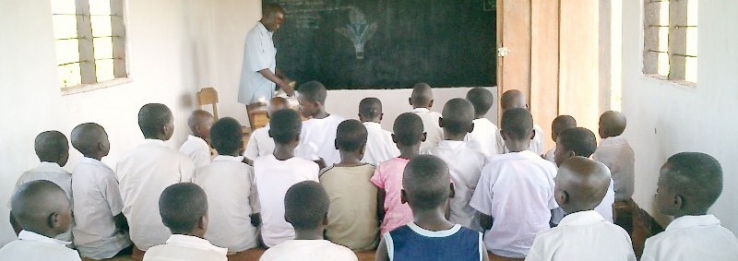Our School Is Growing - 150 Children Now
For the school registration we had to start in Tshikapa, find the needed forms and get the ball rolling. The responsible people from the Education Department there were very helpful and appreciative of our project. Then some school official from Kamonia, the next biggest town near Mushapo, had to visit our school and fill out the forms with us. He was also very helpful and thankful for our new school. Later, in Kinshasa, Gilbert helped us to submit those papers to the Ministry of Education for the registration there.
The second step to get the school sustainable is our agricultural project. Looking at the many difficulties SADR faced in running the farm with the lack of infrastructure etc., we realize we can’t sell any farm products other than what people eat locally. For example SADR planted 3000 pineapple plants, but the roads are so bad, that it is difficult to market them. We tried to bring those nice pineapples to different places with the help of the typical bush transporters, the bicycles who carry heavy loads. But when we bring them there we get so little for them, that it’s not worth the trouble. So, we will concentrate on what people eat locally, which is mainly manioc.
Besides that we are trying to find the best way to feed our team on the farm. We brought seeds from Europe to plant fresh vegetables, onions, tomatoes, carrots, eggplants, salad etc. We tried beans already, but need to find better ground for them. SADR left us three sheep and one of them is pregnant, which is very encouraging. We also started to breed our first chicken to get a few eggs and a little meat sometimes.
Apart from no internet for two months now, sicknesses are another obstacle we have to contend with, esp. since there is no health station far and wide. Blandine got double malaria and triple typhoid and went to Tshikapa for a 7 day treatment. Jean just had a relapse of malaria and Jos and some others had trouble with their stomachs. We had to zero in on the drinking water and make sure that the water from the source is carried in clean containers and boiled properly. Our filter just arrived and we do all we can to have as clean drinking water as possible. Manuela showed the kitchen team how to keep things cleaner when cooking and washing dishes.
Thomas, our young friend from Germany, had a life changing experience on his visit. Here are some of his observations: „…Congo as a country as well as the situation there are for a European unimaginable. Kinshasa, Tshikapa and Mushapo are three very different places which all moved me in different ways… To describe all the things which are missing in Mushapo would probably fill another newsletter of its own. Wolfgang is doing his work where in my eyes is the most hope – with the children. The work of Wolfgang and his sacrifice for the project and the children in the interior have impressed me very much…”
Some people might wonder why the situation is so dire in these remote places. Why are there no schools or very poor ones if any and why do people have no money to send their kids to school? Why do the parents even have to pay to send their kids to school? There are many reasons and we can’t explain all the intricacies and complications involved in just a few sentences, but poverty is one of the main reasons. Looking at the income per capita in the world, Africa and specifically the DR Congo are on the bottom of the list. Here are some reasons for this poverty: selfishness, corruption, wrong mindsets, lack of infrastructure and training etc. But all this is not the fault of the children! We feel they deserve a better chance in their lives and our goal is to give it to them!
Thank you for all your help to make this dream come true! Changing one life, one child, one village at a time makes a difference in this world. Let’s do what we can to make it a better place.





























